The Blue Cabin
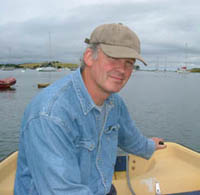 What prompted you to write The Blue Cabin?
What prompted you to write The Blue Cabin?
When we made the move to the island my main feeling and my main emotion at the time with Lynn in mind was guilt: that this had all happened and that I had brought this upon her. We ended up miles away from her roots, her family and the galleries that sold her paintings. There was something of a cathartic release in the writing process, particularly from chapter one, because that tells the story of leaving Scotland, which was the last thing on earth I wanted to do. I knew how hard that was on Lynn. The book was an opportunity for me to tell Lynn how much I understood what I had brought upon her. It was a love letter/apology.
When did you begin to write the book?
We moved in November of 2001 and I think I started to write it in September 2002 and I came back to it now and then. I tried to concentrate more or less on the first calendar year we spent on the island. There is a little bit of license because one or two incidents or parts of incidents came slightly later and I included them because they were seasonal and the kind of thing that occurred. If I was telling a story about geese or a fox that happened a little later, sometimes I stretched the point by a month or two to give the narrative cohesion.
How long did it take you to write?
I submitted the manuscript in September 2004. It took me two years but I was not by any means writing full time, just coming back to it now and again. There was quite a long gap in the middle when I was doing odd jobs. I didn’t go bankrupt until we had got to the island and we had been there for a few months and that left an enormous hole in our finances. Lynn worked hard to keep supplying galleries and I did joinery work, painting and decoration, anything I could that I vaguely had the skills for. I was commuting by boat and I didn’t have the stamina to write effectively.
My most productive time is in the small hours of the morning. I don’t tend to sleep well so particularly in summer I wake up with the dawn and if I write then, I’m usually happier with the results. On the island when dawn breaks and the island wakes up you get a flavour for what the weather will bring and, because we are so undisturbed, looking out onto the foreshore from the front window, it is the best time for spotting birds. It is lovely and quiet before boats start moving on the sand or there are any sounds coming from the mainland, which is directly across from us. The first couple of hours of daylight on the island are a very magical time.
How difficult was it to write such a personal book?
It was very difficult because by nature I am an extremely shy and private person. Having embarked on this project I felt that the only way to do it was to get it on paper, the good and bad. I decided not to spare myself. If it was relevant to the narrative I put it in, whether it exposed me or not, and it sometimes did. I didn’t particularly want to talk about the whole horrible process of bankruptcy but it was very relevant to what we were going though. I don’t particularly enjoy passing on my insecurities about my business failure and why it might have happened, but that was central to the narratives so I put it in. My main thought having had quite a few very successful years in business in Edinburgh was, ‘how can you be so stupid?’ You get the feeling that you have done something terribly wrong, especially when so many people – Lynn, employees, suppliers, so many other people – were effected, not necessarily financially, but they had invested in the business. I had this tremendous feeling that it must be somehow my fault and there was probably a terrible failure of confidence on my part. I included that in the book because it was the truth. I see the book as partly about our life change: the business failure, losing the house and our assets, and then going to the island and finding it was a place which had tremendous restorative value.
And what are the other narrative threads?
There are probably two other threads to the book. One would be the nuts and bolts of island life, describing what it is to live with boat-only access and no mains electricity. The other thread rather surprised me and it wasn’t the way I wrote the book. As the book went on I wasn’t showing it to anyone, apart from to my mother who would read whatever I wrote chapter by chapter and give me a critique, and of course to Lynn, who was reading what I wrote as I finished a chapter and commenting. I wasn’t showing it to friends or asking professionals to look at it, but when I was about three quarters of the way through I sent it to a poet friend from Scotland, who had asked many times whether she could read it. She wrote back and said that she really enjoyed it and had shared all the adventures of island life and the near death experiences and felt the cold and the storms and the wet. Also, and more specifically, she said it read like a love story and that was the first time that thought had occurred to me. Since the book has been published, quite a lot of people have said that. So that is the third thread in the book, the relationship between Lynn and I, although it is somewhat understated because Lynn is a very private person.
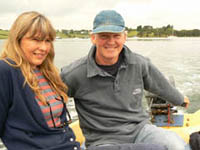 I would think it s tricky business writing about people who are very close to you: how to write them into a book, how to represent them in a way that they’ll be happy with, as well as you.
I would think it s tricky business writing about people who are very close to you: how to write them into a book, how to represent them in a way that they’ll be happy with, as well as you.
I find that particularly difficult and I know Lynn’s first thought on reading a section of the manuscript was that it was my book and she wanted it to stay my book. I had to be aware all the time that she was probably holding back and that I almost had to think for her. One or two people have said that they would have liked to have heard more of Lynn’s voice coming through the book. I’m happy to lay myself bare, but far from it for Lynn to do the same. If I’m a private person, she is even more private.
Another strand that I noticed in the book was that it was a tribute to your father, Brian Faulkner, the last Prime Minister of Northern Ireland. He comes across as a lovable hero.
He was in politics in Northern Ireland at probably the most trying time for a particular leader and inevitably he came in for a lot of flak. I was quite anxious to portray the family man that he was first and foremost. He just loved to have the family together and to do ordinary things and he went to great lengths to ensure he was there for us and we didn’t get too involved in the politics. I used a little device in the book that I’ve used in conversation over the years, that of the ‘Gallery of Heroes’. I’ve always seen him as something of a hero, not just because he was a pioneer of the kind of power-sharing that didn’t unfortunately properly come to fruition until the Good Friday Agreement in 1998, many years after his death, but because he was my dad and one of the family. The fact that he was in high office didn’t in any way detract from the family life that he made sure we all continued to have when we were at home. I really admired him for that and my greatest memories of my father are the fun days we spent on the island, which was our summer home.
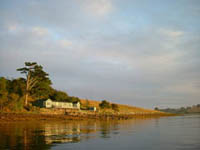 Your style can be very poetic: does the beauty of the island influence your style or is this your natural voice?
Your style can be very poetic: does the beauty of the island influence your style or is this your natural voice?
I have a feeling from the short stories I have written in the past – and the odd article – that this is my voice and the way I tend to write. Obviously, the island is conducive because it is such a beautiful place to be, but I think it will be hard to get away from that style in my next project, which will either be a follow-up, a novel, or both. My style is a little conversational, a little light, a bit whimsical. I do love poetry.
What kind?
Not necessarily poets’ poetry, but people’s poetry. An obituary written by a British Columbian newspaper about Robert Service made the comment that he was Canada’s best-loved poet but that he had never been a poets’ poet. I don’t think the man himself would have taken that as a criticism and I wouldn’t either. Such poetry as there is in my writing style is fairly conversational and, I hope, fairly universally accessible. For clean, readable, conversational prose, Alistair Cooke is hard to beat. I love his writing style. If I am ever in the doldrums or staring at a blank sheet of paper I will tend to pick up Letters From America and read a couple of them. It seems to get the juices flowing again. I also memorise poetry very easily, so I can narrate long passages from Shakespeare. I think I get that from my mum, who trained as a journalist before she married my father. She studied literature at Trinity College Dublin and has always been into reading and reciting poetry.
How often do you recite?
I never recite! Well, very occasionally around a campfire. Then it has to be Robert Service because it is so appropriate.
Although the book is about a huge lifestyle change, it does seem that you and Lynn were more prepared for it than other people might be. You both seem to love isolation.
I wrote in the book that Lynn and I have both seemed to share the same dream and sought isolation. Although I was running a retail business in Scotland, which was a seven-day-a-week occupation, we got away from it when we went home because we lived in a very quiet rural area in Kinrosshire. Our house was at the end of a lane and it could have been wilder but it certainly couldn’t have been much more secluded. It suited both our lifestyles, Lynn feeds off isolation, the landscape and her emotional responses to it. In a sense she needs the isolation and the time to appreciate the landscape. It suited both of us very well. Although Lynn was part of a big family, it was her habit as a child to go off alone and find nooks and crannies on the beach. It has always been in her, in the same way that it has always been in me.
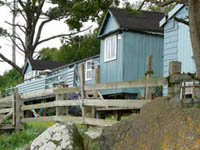 You mentioned in the book that you will not stay on the island, because it essentially belongs to your family. Where will you move? Somewhere secluded?
You mentioned in the book that you will not stay on the island, because it essentially belongs to your family. Where will you move? Somewhere secluded?
Eventually back to Scotland, either on the west coast or the north east. We have friends on the west coast and we have visited the area a lot. Lynn has drawn a great deal of inspiration from Argyllshire. Hopefully we will end up near the water; hopefully seawater! We would miss the water terribly. It would be perfect to have a place on the west coast and a flat in Edinburgh. For a city, Edinburgh is a relaxing place to live, but I don’t think we’ll call it home again: we’ll go somewhere a bit wild.
What are the best and worst aspects of living on Islandmore?
The best aspect is that both of us, and I hope I’m speaking for Lynn, would say that the place has given us a truer sense of perspective. I used to be so focused on business and on material success that little else seemed to matter and, as it turns out, that really wasn’t me. The best thing for us has been its restorative effect and it has been a good platform for moving on. The worst thing, particularly for Lynn, given that she is a natural nest builder, is that it is not our place. We are very much aware of that and of the fact that we can’t stay forever. There is a slight restlessness in being there because the place belongs to the family as a whole and we know that sooner or later we will be making a home somewhere else. In a way, part of us is dying to get started on that process. There were also the near-death sea experiences
…
When I read about those I’m afraid I rather heartlessly just found them exciting.
They are written with a light edge. I certainly didn’t want it to seem that we were seriously, seriously scared. That wouldn’t be true, certainly on my part, although Lynn has never got over one trip to Portaferry when we nearly swamped the boat. She really watches the water now and won’t put to sea unless it is a moderate wind or less. That is probably a good thing.
© Hannah Adcock, 2007
For more information about The Blue Cabin visit: www.thebluecabin.com

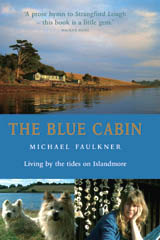
The Blue Cabin Textualities | Hammock Stand on Wed, 3rd Jun 2009 5:28 am
[...] The Blue Cabin Textualities Posted by root 23 minutes ago (http://textualities.net) It was her habit as a child to go off alone and find nooks and crannies on the beach for more information about the blue cabin visit www thebluecabin com tags michael faulkner comments your comment your name required email reserved hovertable theme by mik Discuss | Bury | News | The Blue Cabin Textualities [...]